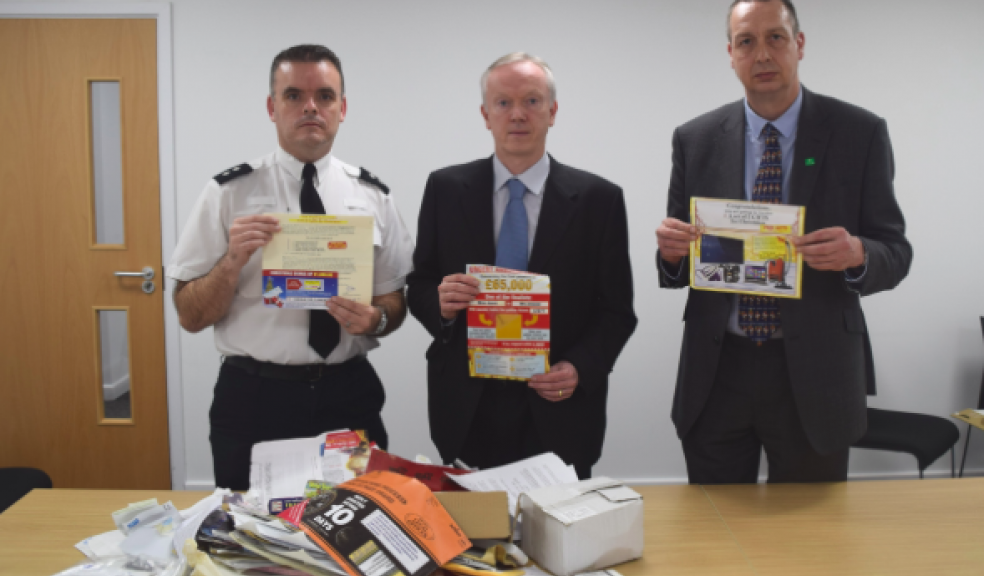
Showing post scams the door in Plymouth
Plymouth City Council’s Trading Standards Team, are working in partnership with Devon and Cornwall Police to tackle the serious impact of scam mail.
Crafty con artists have managed to scam a total £400,000 out of 195 people in Plymouth in the last two years. Nationally it is estimated scams targeting people by phone or post alone cost people in the UK an estimated UK £10 billion each year.
Scammers use a number of tricks to rob people of their hard earned money including cold calls, high-pressure sales tactics and automated voicemails asking for people’s details.
Plymouth Trading Standards are part of the National Scams Team which was formed as a result of a high number of postal scam victims being identified throughout the country.
The National Scams Team provides lists of Plymouth residents who are potential victims. This information has been sourced through partner agencies, including the Metropolitan Police who have seized mailing lists and intercepted post before it has entered the UK postal system.
To try and reduce the number of people who are likely to fall victim of a scam Trading Standards are trialling a new approach when sending out or hand delivering information at the visits.
Information will be sent or handed out in an envelope which looks similar to the scam mail they receive. Research has found that scam victims are more likely to read the mail than if it was delivered in a standard council envelope.
One recent victim had been responding to mailings for many years and was receiveing a large amount of post on a daily basis. The letters were a mixture of catalogues offering her the chance to win a large amount of money, provided she ordered overpriced goods or the usual clairvoyants and prize draw letters asking for administration fees.
Officers worked with adult social care to try to get the mailings and phone calls stopped and to encourage the victim to stop sending the money. The victim said: “Life has become a lot easier since I realised that the mail was in fact scammers wanting me to pay for goods and administration fees for winning I would never receive. The letters were so convincing but I have never won anything in the years I have been doing it.”
Alex Fry, Trading Standards Manager said: “We currently have 550 people remaining on our priority list and by working with the police to actually visit people in their own homes we can to try to stop our residents giving any more of their hard earned money to scammers.”
Plymouth Partnership Inspector, Simon Hardwick said: “We are really pleased to be part of this project. These are elderly vulnerable people that are being financially abused so we want to act as quickly as possible to try to stop the harm. It is important that we all play a part in stopping these criminals.”
Scams come in a variety of guises and we see new ones emerging all the time. However, there are common signs that indicate that they are a scam and Plymouth Trading Standards team are keen to make everyone aware so they can protect themselves and their loved ones.
To get their victims hooked and responding to scams, criminals rely on loneliness, vulnerability, social isolation, shame and the fact that people don’t report that they have been scammed.
The average age of a scam victim is 74, showing that criminals tend to prey on older and often more vulnerable members of society.
Studies have proven that vulnerable adults defrauded in their own home lose confidence and are 2.4 times more likely to either die or go into residential care.
Councillor Downie Cabinet Member for Safer and Stronger Communities said: “These scammers deliberately prey on the vulnerable and more isolated, often elderly people and once a person sends money, their name is added to a scams list which is sold to other criminals and they are retargeted.
“We don’t want anyone to suffer in silence and be misled and bullied by these relentless criminals. If you think your parents, grandparents, partner or friends are receiving large quantities of mail or nuisance phone calls then please don’t hesitate to contact Trading Standards or Citizens advice for help on 0345 040506.”











